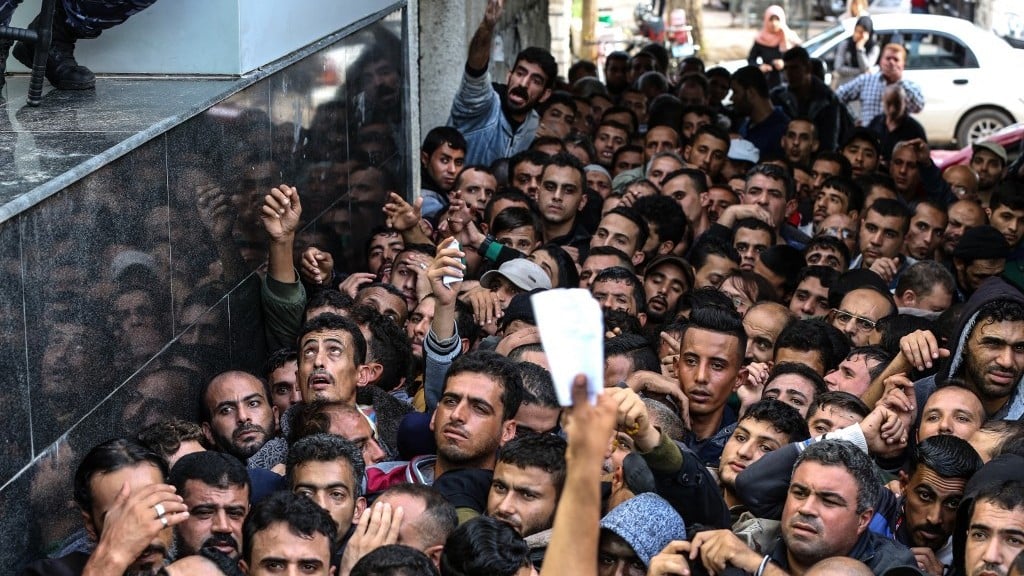
It was a good day for Mohammed – he had just earned $80 from cryptocurrency trading in the besieged Gaza Strip.
When he graduated from the agriculture faculty in 2013, he couldn’t find a good job. His only option was to work at a currency exchange store for around $300 per month.
To increase his salary, Mohammed started trading cryptocurrency in 2014 and was amongst the first traders in Gaza.
“The demand for trading cryptocurrency in Gaza started in 2015 and it was low,” said Mohammed, 32, who is now responsible for all cryptocurrency transactions and has a share in the store.
But buying and selling cryptocurrency is now a popular activity in the strip, which has been under a suffocating 16-year Israeli blockade.
Stay informed with MEE’s newsletters
Sign up to get the latest alerts, insights and analysis,
starting with Turkey Unpacked
“Trading cryptocurrency has significantly increased since 2018 when its market value soared, making thousands of Gazan youths turn to it for income,” says Mohammed.
It has enabled him to buy his apartment in the middle of Gaza City, where the average price of a 130 square metre flat is $40,000.
Digital currency trading became so popular in the coastal enclave that many training centres were offering courses in the field for around $100.
Its popularity was boosted by the sky-high rate of graduate unemployment in Gaza, which at 73.9 percent is the highest in the world.
Many educated youths looked to the internet to earn a living through cryptocurrency trading or digital marketing, says Mohammed Abu Jiab, the editor-in-chief of Gaza’s El-Eqtesadia Newspaper.
“They [traders] may make high profits or endure huge losses in a very short time as it’s a high-risk business,” he told Middle East Eye.
But last year Gaza’s Ministry of National Economy banned many online business activities, such as pyramid trading schemes, Forex trading – which is the biggest platform for trading foreign currencies – as well as the training centres offering courses on cryptocurrency trading, saying they were “negative phenomena”.
However, despite this crackdown, digital currency trading is still popular.
Almost half of currency exchange stores in the strip withdraw and deposit USDT for customers. USDT is a so-called “stablecoin”, a cryptocurrency designed to have a stable price point, which in the case of USDT is $1. Their average commission is one to two percent.
Obstacles
In 2019, Hamas’ military wing, the Al-Qasam Brigades, issued an appeal for donations via Bitcoin and published its crypto wallet address on its website.
Later, Israeli media reported that the government had confiscated $836,136 in cryptocurrency from an allegedly Hamas-connected currency exchange firm in 2021, and seized 30 crypto wallets reportedly used by the group in 2022.
According to Gaza’s cyber security department at the Hamas-run Ministry of Interior and National Security, a half million dollars were confiscated and 21 accounts were blocked and their balances were seized in the first quarter of 2022.
The department noted that it had received 25 complaints in January and February 2022 concerning “foreign hacks” of crypto wallets and 20 complaints relating to Israeli hacks of crypto wallets and accounts.
‘I still don’t know why. Am I a man supporting terrorism? Are you serious? I am a man who is full of life.’
– Mahmoud
In April 2023, Israel’s National Commission for Combating Economic Terrorism seized over 80 digital accounts and hundreds of digital wallets that allegedly had links to Hamas.
But some of these wallets did not belong to Hamas or to any other political party.
For example, in July 2021, Mohammed’s Binance account – which was worth $17,000 – was shut down under the pretext of “supporting terrorism”, without any prior notification.
“I still don’t know why. Am I a man supporting terrorism? Are you serious? I am a man who is full of life. I am a big fan of kebab, not erhab [“terrorism” in Arabic],” said Mahmoud in a sarcastic tone while waiting to break his Ramadan fast.
“Hacking and closing accounts and crypto wallets in Gaza are possible. If you send cryptocurrency to many customers in a short period, your wallet might be closed. Who dares to utter a word if they [Israel] accuse you of supporting terrorism?”
Professor Read Rashid, a blockchain lecturer at the Islamic University of Gaza, told MEE that Binance has a cutting-edge, automated system that can easily discover any stolen accounts or suspicious activity, such as money laundering.
“Gazan accounts were closed as they were accused of supporting terrorism,” said Rashid who participated virtually in a Binance event in Ramallah last month.
“Israel reported these accounts to Binance. Thus, the platform closed these accounts to avoid any charge of supporting terrorism as it’s a global trading platform.”
On Thursday, Hamas‘s armed wing announced it was suspending its bitcoin raising activities.
“This comes out of concern about the safety of donors and to spare them any harm,” the group said in a statement, which also mentioned the increased barriers donors face when wanting to contribute in Bitcoin.
Source of income
He pointed out that cryptocurrency is a good way to make money in Gaza, but the vast majority of traders lose their money due to a lack of experience.
“Anyone who knows how to analyse the cryptocurrency market and trade can turn it into a source of income. The average monthly profit is three percent to four percent of the capital, but sometimes profits soar to 10 percent and even 30 percent when its value increases, as happened last month,” said Rashid.
Mohammed’s friend, Khaled, 30, started trading digital currencies in 2015, three years after graduating as a nurse.
He learned trading directly from the internet and started with $5,000.
“Working in trading is much better than working in Gaza as you can’t even make ends meet here [in Gaza]. Sometimes I lose, but I make profits on other days. Even If I lose a little bit, I still can provide my family with the basics,” said Khaled, whose capital is now worth more than $100,000.
He also had his Binance account blocked on the same day as Mohammed.
“There were 20,000 USDT in my account when Binance blocked it under the pretext of supporting terrorism,” he said. “I was shocked. I was only a crypto trader who used to trade, withdraw and deposit for customers to take my commission without any military interests,” he added.
“I kept contacting Binance support without any result. After a month, they closed my account and seized my balance. They sent me an email for an Israeli security party and asked me to reach out to it to solve my problem, but I refused to avoid any security suspicions.”
He says that he was seriously affected by his loss and has changed the way he works as a result.
Now, in order to avoid being blocked again, Khaled uses different wallets and cryptocurrency trading platforms, works with exchange currency stores, and only deals with a few well-known clients.
As for Mohammed, Binance also sent him an email and asked him to contact the Israeli army. “I made some tries but all went in vain,” he said.
‘Violations against Palestinians’
Mohammed Abu Hashem, a human rights researcher, told MEE that Israel did not respond to such traders, adding that he believes confiscating any amount of money without a legal basis is a violation of the right to property.
“Israel invokes international anti-terrorism law to commit its violations against Palestinians and confiscate their money,” he said.
“It commits such violations because it knows for sure that no one holds it accountable.
“Unfortunately, the only legal resort for those youths [who have been affected] is the Israeli judiciary, which is historically known to be a tool that the Israeli authority uses against Palestinians.”
And the crackdown is not only happening in Israel.
On 27 March this year, the US Commodity Futures Trading Commission (CFTC) filed a civil enforcement action in the federal court, in Chicago, USA.
It charged its Canadian founder, Changpeng Zhao, with “willful evasion of federal law and operating an Illegal digital asset derivatives exchange”.
The 74-page case file contains various charges, one of which was “facilitating potentially illegal activities” to Hamas in 2019.
Samuel Lim, Binance’s former compliance chief said: “Terrorists usually send small sums as large sums constitute money laundering. [They] can barely buy an AK47 with 600 bucks.”
MEE contacted Hamas many times for a comment, but the group did not respond.
On Friday, Hamas’s armed wing announced it was suspending its bitcoin raising activities.
Rashid and Abu Jiab expect Binance to impose more restrictions on Gaza’s cryptocurrency trading following the US CFTC’s actions and believe the action could have serious consequences.
“The file may cause more challenges for Gaza’s youths trading cryptocurrency,” Abu Jiab said.








